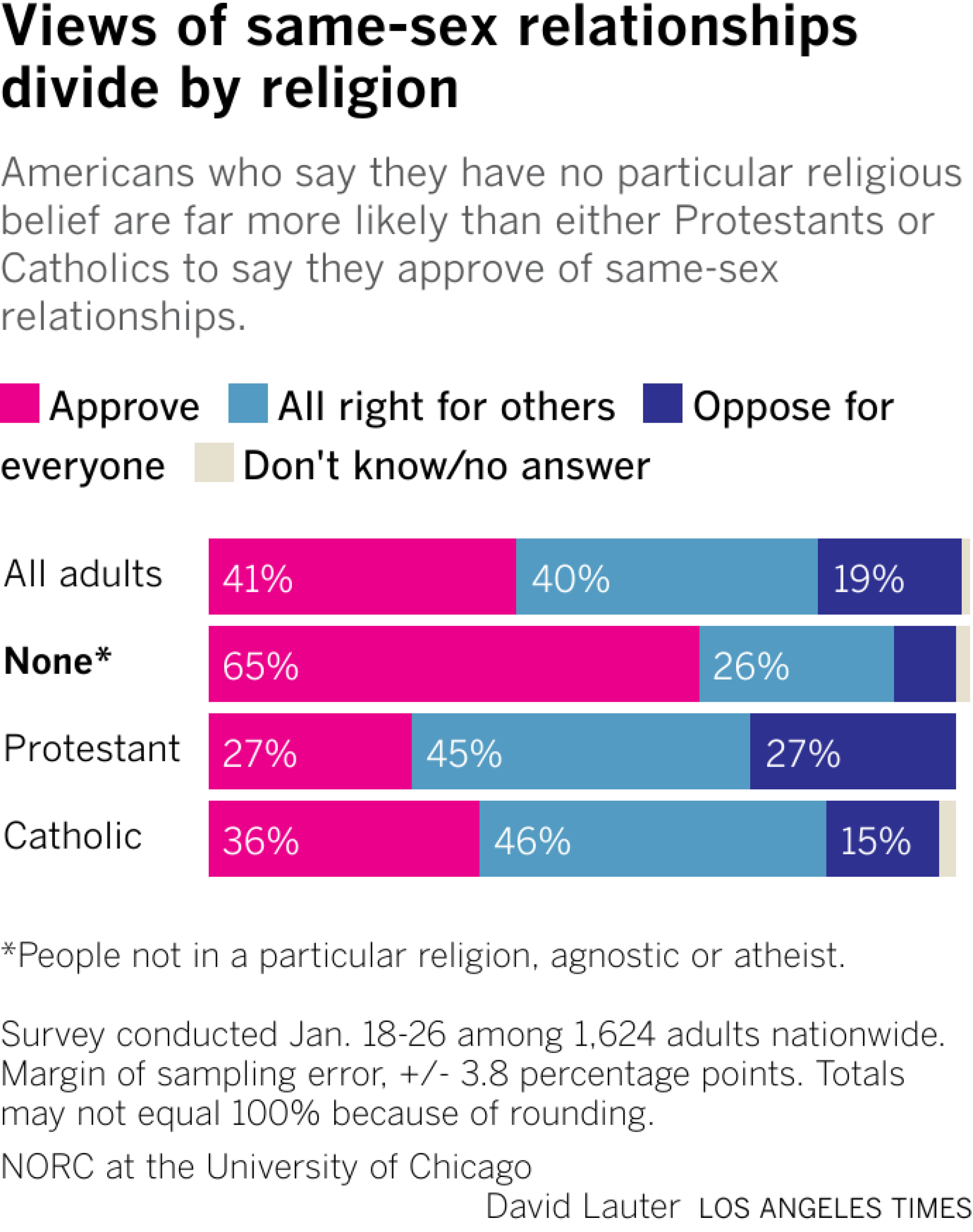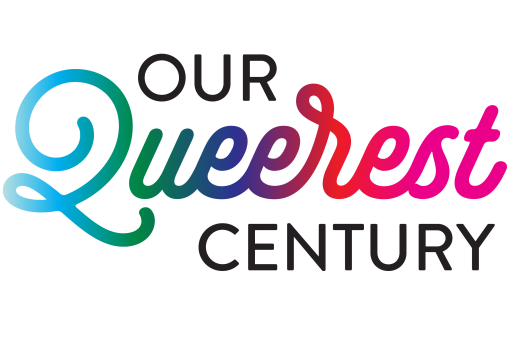
There’s a clear divide in how Americans view the influence of LGBTQ+ people in society.
Three out of four Democrats who said LGBTQ+ people have had an impact on the U.S. see that as positive, according to a nationwide poll conducted for The Times by NORC at the University of Chicago.
With queer lives and culture under threat, Our Queerest Century highlights the contributions of LGBTQ+ people since the 1924 founding of the nation’s first gay rights organization.
Pre-order a copy of the series in print.
Nearly the same share of Republicans, 77%, said the influence of LGBTQ+ people has been somewhat or very negative.
A similar divide falls along religious lines, with about two-thirds of adults who identify as Protestants saying that the influence has been negative, while 69% of those who identify as having no religion or being atheist or agnostic see the influence as positive.
The responses reflect the most noticeable divide in the poll. Politics and religion, not education, race or income, are the biggest indicators of how Americans feel about LGBTQ+ rights and the place of queer people in society.
Put differently, how LGBTQ+ people are viewed depends heavily on where one falls in red and blue America and where one worships, if at all.

The data are consistent with the increasing political polarization across the nation, which has seen decades of the so-called culture wars — clashes on abortion, end-of-life healthcare, birth control and a host of LGBTQ+ issues including same-sex marriage.
“I was raised in the church, and it says in the Bible about people of the same sex not having a relationship,” said Kendra Jackson, of Ventura, explaining that her views on LGBTQ+ people are rooted in her religion.
Jackson, who is in her early 50s, is aware of the reality of the modern LGBTQ+ community and the moral strictures of her faith. Her sister and a niece are lesbians and another niece is transgender. But at her Baptist congregation, her pastor rails against homosexuality, shows little tolerance for LGBTQ+ people and tells his congregants not to email or confront him afterward if they disagree with his sermons.
“A lot of members have stopped going because they have gay and lesbian children, and of course they feel differently,” Jackson said.
As to her relatives who are LGBTQ+ and the wider society, “It’s all around me,” she said. “I’m not going to love them any different because of who they are, but it’s not for me.”

The new poll, paid for by the California Endowment, highlights the huge changes in public attitudes since a similar survey conducted by the Los Angeles Times in 1985.
The survey also spotlights the resistance to accepting queer people among roughly one-third of the country, a group that is heavily Republican and significantly more likely than the rest of the adult population to identify as Protestant or Catholic.
One question is illustrative. In 1985, nearly 2 in 3 people said they would be very upset if their child was gay or lesbian. Today just 14% say that.
Half of adults today said that, if their child came out as gay or lesbian, it would not be an issue. But among people who identify as Protestant or other Christian, nearly half say they would be upset, with about 1 in 5 saying they would be very upset.
Asked whether sex between two adults of the same sex is wrong, Republicans are more likely than Democrats to say yes. Protestants and Catholics are also more likely than those who are nonreligious to say that same-sex sexual relations are wrong.
That’s a view shared by Timothy Mayo of Clay Center, Kan.: Sex between two adults of the same sex is “morally wrong,” said Mayo, a registered Republican who said his views are rooted in his Christian faith.
“Even though they think they are gay and lesbian or whatever, Christ will still love them and still forgive them, and it’s not my place to condemn them — but it doesn’t make it right,” said Mayo, who is a deacon at his Baptist congregation in his town of 4,000 people just south of the Nebraska border.
More than a quarter of Protestants said they would be less likely to vote for a gay or lesbian candidate for public office, compared with 8% of atheists and nonreligious people. If candidates were transgender or nonbinary, respondents across religious groups — 43% of Protestants, 35% of Catholics and 30% of other religious groups — said they would be less likely to vote for them.
Nearly half of Protestants and Catholics said same-sex relationships were all right for others but not for themselves.
Two-thirds of those who are atheist, agnostic or nonreligious say they personally approve of same-sex relationships, while just over a quarter of those who are Protestant approve.
“I honestly don’t care what consenting adults do, whether it’s religion, sexual orientation or political views,” said Richard Carr, who runs his own recycling business in Portland, Ore. “As long as you are not hurting kids or animals, I don’t care what you do,” adding that he believes “sex is somewhat fluid based on your circumstances.”
Carr, 55, is also a Republican who believes in conservative ideals but distances himself from “a lot of the crap” of the modern day GOP. Raised in a conservative Jewish family, Carr said that today, he’s nonreligious: “I have no religion at all — I don’t know how to explain what I am.”
He questions the reliance on the Bible by Christian adherents, saying, “Anything written by man is corrupted by man.” And in religion, he sees a force that runs counter to a stable community.
“All it does is make people divided or develop hatred for things,” Carr said. He explained that he’s usually wrinkled his nose at people who question others’ private lives, like his family did about him not marrying — although he’s had a girlfriend for a quarter-century.
“As an adult, I made a decision — do I care or do I not? I say, why do I care? It doesn’t bother me,” Carr said.
The increase in political and media attention on transgender and nonbinary people is viewed as a bad thing for society by 40% of adults. But among all adults, there is a clear divide: Two-thirds of Republicans view the political and media attention on trans people as bad, while less than 20% of Democrats agree.
Among religious groups, the divide persists: 49% of Protestants and 43% of Catholics viewed the media attention on trans people as bad compared with 29% of atheist and agnostic adults.
Jackson, the Ventura County grandmother, said she worries about the increasing visibility of transgender, nonbinary, gay and lesbian people — in entertainment, politics and advertising.
“I see it being forced on other people,” Jackson said. “Watching TV nowadays, a lot of commercials are geared toward transgenders or lesbians, and I think its wrong.”
NORC conducted this poll in January using its AmeriSpeak panel, a probability-based panel designed to reflect U.S. households overall. The poll surveyed 1,624 adults — including 775 Californians and 313 LGBTQ+ people — and was weighted to match benchmarks for age, gender, census division, race and ethnicity, and education. It had an estimated margin of error of 3.8 percentage points for the full sample.

